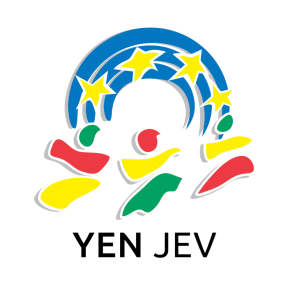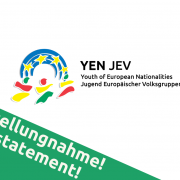Supporting Statement of the Youth of European Nationalities for the Minority SafePack Initiative
The European Citizens’ Initiative “Minority SafePack” that is one of the most important minority-related initiatives in Europe in the last decades, calls for promotion and improvement of minority rights in the European Union, in this the rights of minority youth.
With the positive feedback that the initiative received during the public hearing in the European Parliament on 15 October 2020, the unanimous adoption of the resolution of the German Bundestag, the adopted resolution in support of the Initiative of the European Parliament, we as the Youth of European Nationalities (YEN), a European network representing young people from ethnic, national and linguistic minorities, feel the need to highlight the importance and impact that the European Citizens’ Initiative “Minority SafePack” would have on young people from minorities.
YEN has been actively supporting the process of the ECI throughout the member states of the European Union since its very beginning. We have contributed with the collection of thousands of signatures, successfully reached out to other youth organizations, such as national youth councils, the European Youth Forum and other European networks, and amplified the youth voice, demonstrated the power of youth activism and encouraged solidarity with minority rights.
The success of the ECI in its initial stage underlines the European wide support and need for the recognition and implementation of minority rights. A positive recommendation of the Minority Safepack will be vital to all youth in the European Union and will have a positive impact on their lives and opportunities to participate in an equal and inclusive society. We highlight the need for a positive recommendation for all proposals of the ECI Initiators, but we also stress that a negative reply for one proposal cannot lead to a negative recommendation for all proposals of the Initiative.
There is a need to raise awareness and appreciation to the vast diversity within Europe. Young members of minority communities experience barriers to express, develop, and maintain their diverse cultural, linguistic or ethnic identities. They face challenges in the formal educational system to learn about (their) minority culture, history and languages. What is more, by excluding minorities and diversity from the school curricula, negative stereotypes remain, and exclusion and discrimination of minorities thrive. A Europe that is actively protecting and promoting cultural and linguistic diversity and living its motto, would positively affect the identity formation process of future young generations. Full equal social participation of every young person in the European Union, majority or minority, can only be achieved by paying specific attention to the protection of minority rights.
As young people are at an identity formation stage, having a Language Diversity Centre in the field of regional and minority languages – as proposed by the ECI initiators – where language diversity and multilingualism in Europe are not only celebrated but supported and recognized, would greatly impact their confidence to more openly identify as a minority. Additionally, the Centre can raise awareness amongst young majority members about European linguistic heritage and create opportunities to improve the knowledge about and to learn the minority languages present in their respective countries. The Centre could be a point of reference for researching opportunities of minority languages and document these languages, raising awareness on multilingualism and serving as a source of language learning. Amongst minority youth there is a need for accessible and transparent information on diversity, as they often feel alone and isolated and the Centre could provide this base.
Minorities, especially minority youth, are building bridges across countries through international exchanges and non-formal educational activities that support peer-to-peer learning. Including the protection of national minorities and the promotion of cultural and linguistic diversity in the objectives of EU’s regional development funds would encourage even more young people to meaningfully engage in the regional social and political issues and take full part in democratic processes. Funding and support will expand the number of minorities recognized and supported, and create more opportunities for minorities already recognized, as implementation often falls short due to a lack of funding (and the will and commitment to create funding).
When talking about minority identity amongst youth, it is affected by many external factors, one of them being the lack of research and data on the contributions of minorities to European societies. Evidence-based measures will impact young people more than any other social group as they will have access to learning and better understanding of their minority history and its role in the historical events of their respective country. Confirmation by research that minorities are a value for societies in Europe and that they play an important role in the formation of Europe will boost minority youth self-esteem and have a direct impact on their identity.
Moreover, young people are not only facing barriers in accessing their basic human rights, such as their right to democratic participation, quality education, employment, but there are significant existing digital gaps between their peers and themselves. There is a need to develop digital tools for minority communities to have equal digital participation and access to information and opportunities. In addition, young people from minorities would greatly benefit from improving cross-border access to audio-visual media services and contents as they serve for young people as means of participation, access to information and news, but also access to cultural life, educational and professional opportunities. Adopting rules that would prevent these unjustified geographically-based content restrictions would provide possibilities for young people to follow major world events in their mother tongue and access their cultural heritage. Moreover, access to diverse and comprehensive media services encourages critical thinking skills and media literacy, competencies that are crucial for young people to take an active part in modern societies.
Young people from minorities face unique challenges in accessing resources and opportunities. They are seen as the future yet not included in the development mechanisms of the present. There is a desire from minority youth for more open governance and opportunities to influence decisions. The engagement of young people in the social, economic and political decisions affecting their communities is essential for the future of democratic institutions. “Engage, Connect, Empower” are the framework of the new EU Youth Strategy. Positive recommendation of the European Commission on the Minority SafePack would contribute to successfully meeting also the vision behind the European Youth Goals and support its joined-up implementation across sectors.
Each of the Minority SafePack legislative proposals aims towards a meaningful civic, economic, social, cultural and political participation of young people from minorities and will support building of spaces and opportunities for young people to take active part in their communities and European society as a whole.
We urge the European Commission when formulating an opinion to take into consideration the positive effects that a successful recommendation would have on young people.
We underline the massive involvement and contribution of young people during the whole process of the ECI. The fact that the Initiative was widely embraced by youth shows that they urge the need for promotion and improvement of minority rights in the European Union.
The statement as PDF-File [here].



